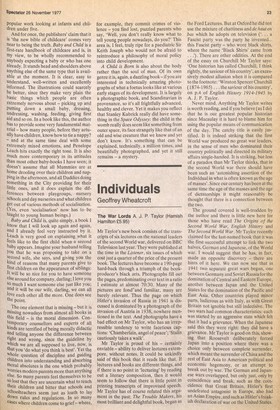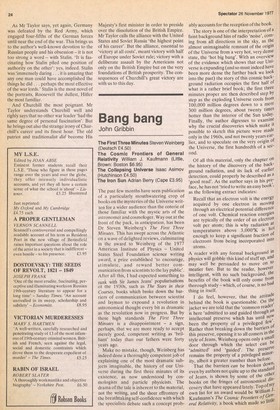Individuals
Geoffrey Wheatcroft
The War Lords A. J. P. Taylor (Hamish Hamilton £5.95) Mr Taylor's new book consists of the transeripts of six lectures on the national leaders of the second World war, delivered on BBC Television last year. They were published at the time in the Listener, six issues of which cost just a quarter of the price of the present book. The lectures have become a 190-page hard-back through a triumph of the bookproducer's black arts. Photographs fill out the pages, predominating over text in a ratio I estimate at almost 70:30. Many of the pictures are fond'and familiar, many are barely relevant. Thus the page on which Hitler's invasion of Russia in 1941 is discussed is dominated by a photograph of the invasion of Austria in 1938, nowhere mentioned in the text. And photographs have a bad effect on Mr Taylor, who has an irrepressible tendency to write facetious captions: 'Chamberlain, angel of peace; 'Stalin cautiously takes a walk'.
Mr Taylor is proud of his — certainly enviable — ability to deliver lectures extempore, without notes. It could be unkindly said of this book that it reads like that. If lectures and books are different things, and if there is no point in 'lecturing' by reading out a literary composition, then it would seem to follow that there is little point in printing transcripts of improvised speech. Mr Taylor has of course refuted this argument in the past: The Trouble Makers, his most brilliant and delightful book, began as the Ford Lectures. But at Oxford he did not use the mixture of chattiness and de haul en bas which he adopts on television ('. . a Fascist party was the party he invented.. this Fascist party — who wore black shirts, where the name 'Black Shirts' came from .'). There are other oddities. At the end of the essay on Churchill Mr Taylor says: 'One historian has called Churchill, I think rightly, the saviour of his country', an excessively modest allusion when it is compared to the footnote: 'Winston Spencer Churchill (1874-1965) . . . the saviour of his country', on p.4 of English History 1914-1945 by A. J. P. Taylor, Never mind. Anything Mr Taylor writes is worth reading, and if you believe (as I do) that he is our greatest popular historian since Macaulay it is hard to blame him for using the popular means of communication of the day. The catchy title is easily justified. It is indeed striking that the first World war produced no great war leaders, in the sense of men who dominated their country politically and directed its military affairs single-handed. It is striking, but less of a paradox than Mr Taylor thinks, that in the second World war there should have been such an 'astonishing assertion of the Individual in what is often known as the age of masses'. Since our century has been at the same time the age of the masses and the age of dictatorships it might reasonably be thought that there is a connection between the two.
The ground covered is well-trodden by the author and there is little new here for those who have read The Origins of the Second World War, English History and The Second World War. Mr Taylor recently claimed for the last-named book that it was the first successful attempt to link the two halves, German and Japanese, of the World war. I would suggest that he has, in fact, made an opposite discovery — there are hints of it here. We can now see that in 1941 two separate great wars began, one between Germany and Soviet Russia for the domination of Central and Eastern Europe, another between Japan and the United States for the domination of the Pacific and East Asia. Other countries played minor parts, ludicrous as with Italy, as with Great Britain not ignoble but still indecisive. The two wars had common characteristics: each was started by an aggressive state which felt that it had a grievance. When the Japanese said this they were right: they did have a grievance. Mr Taylor is goolion this, showing that Roosevelt deliberately forced Japan into a position where there was a choice only between complete surrender, which meant the surrender of China and the rest of East Asia to American political and economic hegemony, or an attempt to break out by war. The German and Japanese wars overlapped, but only just, only by coincidence and freak, such as the coincidence that Great Britain, Hitler's first undefeated antagonist in Europe, also had an Asian Empire, and such as Hitler's freakish declaration of war on the United States. As Mr Taylor says, yet again, Germany was defeated by the Red Army, which engaged four-fifths of the German forces until near the end of the war. This brings us to the author's well-known devotion to the Russian people and his obsession — it is not too strong a word — with Stalin. 'It is fascinating how Stalin piled one position of authority on the other': yes, indeed. Stalin was Immensely daring. . . it is amazing that any one man could have accomplished the things he did. . . perhaps the most effective of the war lords.' Stalin is the most novel of the portraits, Roosevelt the dullest, Hitler the most familiar.
And Churchill the most poignant. Mr Taylor understands Churchill well and righly says that no other war leader 'had the same degree of personal fascination'. But he brings out also the strange irony of Churchill's career and its finest hour. The old patriot and traditionalist did become His Majesty's first minister in order to preside over the dissolution of the British Empire. Mr Taylor calls the alliance with the United States and Soviet Russia `the highest point of his career'. But the alliance, essential to `victory at all costs', meant victory with half of Europe under Soviet rule; victory with a deliberate assault by the Americans not only on the British Empire but on the very foundations of British prosperity. The consequences of Churchill's great victory are with us to this day.







































 Previous page
Previous page